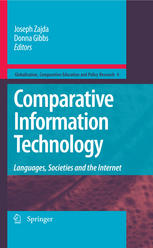

Most ebook files are in PDF format, so you can easily read them using various software such as Foxit Reader or directly on the Google Chrome browser.
Some ebook files are released by publishers in other formats such as .awz, .mobi, .epub, .fb2, etc. You may need to install specific software to read these formats on mobile/PC, such as Calibre.
Please read the tutorial at this link: https://ebookbell.com/faq
We offer FREE conversion to the popular formats you request; however, this may take some time. Therefore, right after payment, please email us, and we will try to provide the service as quickly as possible.
For some exceptional file formats or broken links (if any), please refrain from opening any disputes. Instead, email us first, and we will try to assist within a maximum of 6 hours.
EbookBell Team

0.0
0 reviewsThis volume offers a critique of the nexus between ICT and its impact on society, individuals and educational institutions. One of the most significant dimensions of globalisation has been the rapid development of information and communications technologies (ICTs). Our lives have been changed by ICTs in numerous ways and the implications for education are enormous. The ICTs have transformed the linguistic, cognitive and visual dimensions of human communication, as well as our perceptions of the self, and social identity in the global culture. They have facilitated the development of new dimensions of digital literacy, such as blogging and sms messaging. In this sense, cyberlanguage continues to evolve by borrowing and adapting familiar words, coining new expressions, and embracing particular styles.
The book provides directions in education and policy research, relevant to transformational educational reforms in the 21st century.